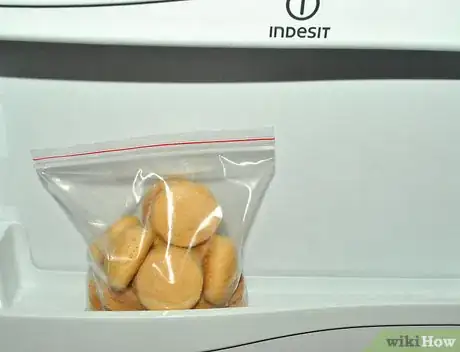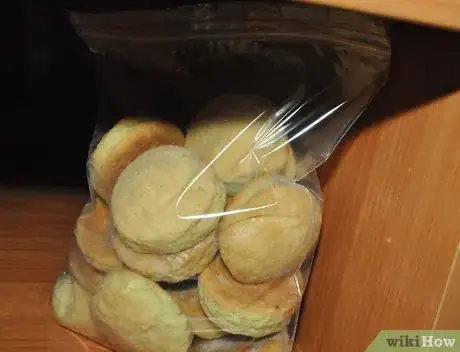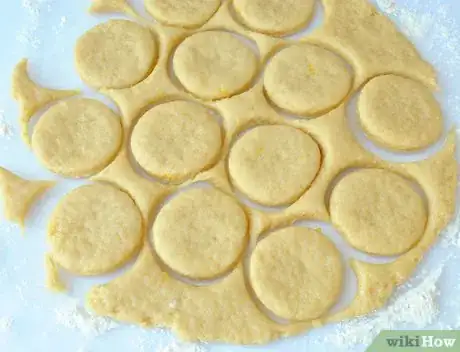This article was co-authored by JoAnna Minneci. JoAnna Minneci is a Professional Chef based in the Nashville, Tennessee area. With more than 18 years of experience, Chef JoAnna specializes in teaching others how to cook through private cooking lessons, team-building events, and wellness and nutrition classes. She has also appeared in numerous television shows on networks such as Bravo and Food Network. Chef JoAnna received Culinary Arts training from the Art Institute of California at Los Angeles. She is also certified in sanitation, nutrition, kitchen management, and cost control.
This article has been viewed 87,368 times.
Nothing beats a warm, fluffy biscuit straight out of the oven. Getting that same level of quality out of stored biscuits can be tricky, but fortunately, they are very easy to wrap up and preserve. Leftover biscuits can be put into the refrigerator to preserve them for longer. For optimal freshness, freeze raw dough instead to cook biscuits whenever you need them.
Note: This article is a recipe for biscuits as they are known in America, which is a type of bread. If you are looking for instructions on storing the type of biscuit that is typically served as a dessert, check out How to Store Homemade Cookies.
Things You Should Know
- Store your biscuits in an airtight container, like a reusable plastic bag. Before you close the bag, push all of the air out of the container.
- Biscuits generally last 1 week in the fridge, 3 months in the freezer, and 2 days at room temperature.
- Keep dough fresh by separating it into pieces, wrapping it in plastic, and freezing it for 3 hours. Then, transfer your dough to its permanent storage.
Steps
Cooked Biscuits
-
1Cool cooked biscuits for about 30 minutes on a wire rack. Take the biscuits out of the oven once they are done cooking. If you have a wire rack available, moving them to it allows them to cool faster. Otherwise, move the biscuits to paper towels or a cool baking tray. Wait for the biscuits to cool completely before storing them.[1]
- Using a wire rack is the fastest way to cool biscuits. Expect a longer cooling time when using other methods.
- The baking tray you used to originally cook the biscuits will still be warm when it comes out of the oven. This can cause the biscuits to overcook, so move them to a cooling rack as soon as possible.
-
2Move the cooled biscuits to an airtight container. An easy way to store the biscuits is to move them into resealable plastic bags. Push as much air out of the bags as possible before closing them. Plastic containers or tins will also work, but you have less control over the amount of air sealed in with the biscuits. Biscuits stored this way may dry out faster than usual.[2]
- Another option is to wrap the biscuits up tightly in a few layers of foil or plastic wrap.
Advertisement -
3Refrigerate biscuits up to 1 week if they have perishable ingredients. Any biscuit can be stored in the refrigerator, but biscuits with ingredients like cheese or cream cheese always need to be stored there. Make sure the biscuits are well-sealed so they stay at the proper consistency until you use them.[3]
- Throw away any biscuits that smell bad or look moldy.
-
4Keep biscuits for up to 2 days if they are stored at room temperature. As long as biscuits are stored properly, they can be left out of the refrigerator. Put them on the counter or in a cabinet. Unfortunately, they will dry out over time, so opt for a different storage method if you don’t expect to use them right away.[4]
- Room temperature storage may be suitable if you didn’t make a lot of biscuits. Keep larger batches in the refrigerator to prevent them from turning to stone quite as quickly as they would on the counter.
-
5Store biscuits for up to 3 months if freezing them. The best storage method is vacuum-sealed bags. If those aren’t available, a freezer-safe plastic bag, container, plastic wrap, or foil work well. Check the wrapping to make sure it is airtight before moving the biscuits into the freezer.[5]
- Biscuits will last indefinitely in the freezer. After 3 months, they may lose quality, but they are still safe to eat.
Raw Dough
-
1Cut the dough into 1 in (2.5 cm) thick circles. Prepare the dough like you normally would when baking the biscuits. After making the dough, divide it up with a pastry cutter. Try to keep the biscuits the same size so they cook evenly when you do put them in the oven.
- Another easy way to divide up the dough is to cut it into squares with a bench knife.
-
2Lay the biscuit dough on a parchment-lined baking tray. Spread the biscuits out in a single layer on the tray. Using the parchment paper will prevent the dough from sticking to the tray. If you don’t have parchment paper, you can put the dough directly on the tray, but give the biscuits plenty of time to solidify before attempting to remove them.[6]
- Pre-packaged dough can simply be put in the freezer. You do not have to cut it up first, although this can make baking the biscuits easier later.
-
3Cover the dough and freeze it for up to 3 hours. Place plastic wrap loosely over the baking tray before sticking it in the freezer. Raw dough may freeze quickly, so check it every 30 minutes. Wait for the dough to harden all the way through before you remove it from the freezer. You can test it by touching it.[7]
- Avoid leaving the dough in the freezer for too long, especially when left uncovered. The dough can dry out over time, losing taste.
-
4Move the frozen dough to a sealed container. Slide the frozen dough off the parchment paper and into freezer-safe containers. Plastic bags work well, but squeeze out as much air as you can before sealing them. The biscuits do not need to be stored individually, so put as many as you can fit into each bag or container.[8]
- You can also wrap the dough in foil or plastic wrap. Wrap it up tightly in a few layers to prevent frost damage.
-
5Freeze the biscuits for up to 3 months. Store the sealed dough in the freezer until you are ready to use it. Dough stored this way will last indefinitely, although it may begin losing quality after 3 months.[9]
- When you need the dough, you can easily take out what you need, then bake it until it browns.
- If you want to make good biscuit dough, use a self-rising flour like White Lily.
- You can use buttermilk and cold butter with it.[10]
- Grate it directly into the flour and then stir in the salt and buttermilk. So that it comes together in a mass.[11]
Things You’ll Need
Saving Cooked Biscuits
- Wire cooling rack
- Resealable bags, containers, or wrap
- Refrigerator or freezer
Freezing Raw Dough
- Baking tray
- Parchment paper
- Freezer-safe bags, containers, or wrap
- Freezer
References
- ↑ https://www.bbc.com/food/biscuit
- ↑ https://www.tasteofhome.com/cooking-tips/muffins/storing-muffins--biscuits-and-scones
- ↑ https://www.tasteofhome.com/cooking-tips/muffins/storing-muffins--biscuits-and-scones
- ↑ https://www.tasteofhome.com/cooking-tips/muffins/storing-muffins--biscuits-and-scones
- ↑ https://www.stilltasty.com/Fooditems/index/16526
- ↑ https://www.geniuskitchen.com/recipe/freezer-buttermilk-biscuits-247911
- ↑ https://www.geniuskitchen.com/recipe/freezer-buttermilk-biscuits-247911
- ↑ https://www.stilltasty.com/fooditems/index/18753
- ↑ https://www.stilltasty.com/fooditems/index/18753






























































